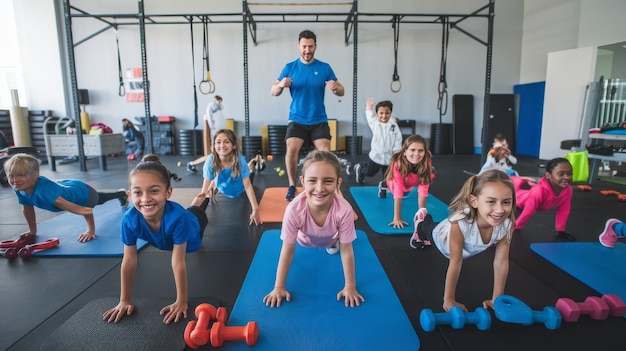In today’s digital age, children and teens are increasingly leading sedentary lifestyles. Encouraging physical activity outside of school hours has become more important than ever. After-school fitness programs provide an engaging and structured way for youth to stay active, build healthy habits, and develop social and emotional skills. When combined with the collaborative approach of a community partnership school, these programs create supportive environments that foster long-term physical, mental, and emotional well-being. By promoting consistent activity and wellness practices, these programs help students develop the foundation for lifelong healthy habits.
Promoting Physical Health and Fitness
Enhancing Cardiovascular Strength
Participation in after-school fitness programs helps youth improve cardiovascular endurance. Activities such as running clubs, cycling, and aerobic workouts strengthen the heart and lungs, supporting overall fitness and energy levels. Consistent participation sets the stage for maintaining a healthy lifestyle into adulthood.
Developing Strength and Flexibility
Fitness programs often include exercises targeting strength, balance, and flexibility. Yoga, resistance training, and stretching routines not only improve muscle tone but also reduce the risk of injury, helping youth develop well-rounded physical fitness.
Preventing Childhood Obesity
Childhood obesity continues to be a significant public health concern. Structured physical activity provided by after-school fitness programs encourages regular movement, helping students maintain healthy weight and supporting long-term metabolic health.
Supporting Mental and Emotional Well-Being
Reducing Stress and Anxiety
Physical activity is a proven method to alleviate stress and anxiety in children and teens. Engaging in fitness activities allows youth to release tension, boost mood, and develop emotional resilience, contributing to overall well-being.
Enhancing Cognitive Function and Focus
Exercise increases blood flow to the brain, improving concentration, memory, and problem-solving abilities. Students who regularly participate in after-school fitness programs often show enhanced academic performance and engagement in classroom activities.
Building Self-Confidence and Motivation
Mastering new skills, achieving personal goals, or participating in team sports fosters self-confidence. Youth who feel physically capable are more likely to embrace challenges, maintain motivation, and develop a positive self-image that extends beyond physical activity.
Encouraging Social Skills and Collaboration
Teamwork and Cooperation
Many after-school fitness programs incorporate team sports and collaborative activities. These experiences teach youth how to communicate effectively, work together toward shared goals, and develop social problem-solving skills.
Leadership and Responsibility
Fitness programs provide opportunities for youth to take on leadership roles, such as team captain or activity organizer. These experiences build responsibility, decision-making skills, and confidence, preparing students for challenges both in school and life.
Fostering Community Connections
A community partnership school model strengthens ties between students, families, and local organizations. By involving community members in fitness programming, students experience mentorship, guidance, and support that enhances both social and emotional growth.
Building Lifelong Healthy Habits
Establishing Consistent Physical Activity Routines
One of the primary benefits of after-school fitness programs is creating consistency. Regular participation helps youth internalize exercise as a natural part of daily life, increasing the likelihood of maintaining active habits into adulthood.
Encouraging Balanced Lifestyle Choices
Fitness programs teach youth the importance of balancing academics, recreation, and wellness. By promoting holistic health, students learn to prioritize physical activity alongside other responsibilities, fostering sustainable habits for the future.
Creating Positive Attitudes Toward Wellness
Experiencing the benefits of regular activity such as improved energy, mood, and social engagement helps youth develop a positive attitude toward health. A community partnership school environment further reinforces these values by modeling wellness and providing ongoing support.
Frequently Asked Questions About After-School Fitness Programs
- What are after-school fitness programs?
They are structured programs designed to promote physical activity, health, and wellness among students outside regular school hours. - How does a community partnership school support fitness programs?
By connecting schools with local organizations, mentors, and resources, students gain additional support to engage in healthy activities. - At what age should children participate in after-school fitness programs?
Fitness programs can be adapted for children as young as kindergarten, with age-appropriate activities that encourage safe participation. - Can after-school fitness programs improve academic performance?
Yes, regular physical activity enhances focus, memory, and cognitive function, which can translate into better classroom performance. - Do these programs benefit mental health?
Absolutely. Fitness programs reduce stress and anxiety, boost mood, and foster emotional resilience.
Conclusion
After-school fitness programs play a vital role in helping youth develop lifelong habits of physical activity, wellness, and social engagement. By promoting physical health, enhancing emotional well-being, and fostering teamwork, these programs equip students with the tools needed for a balanced and active lifestyle. Beyond the physical benefits, participation in structured fitness activities teaches discipline, goal-setting, and resilience, helping students navigate challenges both in and out of school. When implemented within a community partnership school model, students gain access to mentorship, guidance, and supportive networks that strengthen participation and overall impact. Programs like the Youth Wellness Initiative demonstrate how combining structured fitness regimens with community support, educational enrichment, and peer engagement can transform youth into active, confident, and health-conscious individuals. By nurturing both mind and body, these initiatives prepare students to lead vibrant, fulfilling lives while fostering a culture of wellness that extends into their families and communities.
